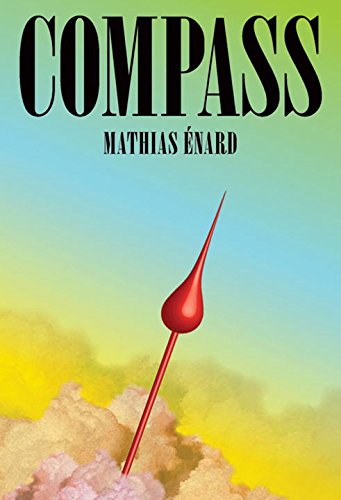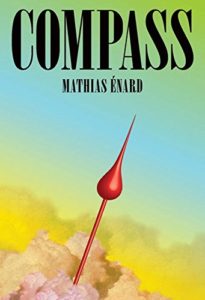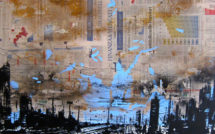

In the beginning, we are woven into a cloud of smoke. Mathias Enard’s Compass begins in a haze of opium—“We are two opium smokers each in his own cloud, seeing nothing outside, alone, never understanding each other we smoke, faces agonizing in a mirror…” (5)
And so we are introduced to Franz Ritter, a musicologist living in the lull of Vienna, and he is dying. His illness is unspecified—one can only speculate as to the nature of his disease—but it keeps him up at night. During one particularly bad bout of insomnia, Franz recalls the most significant years of his life. His story is one of East and West, Europe and the Orient, and a romanticism of the Middle East that takes him to Damascus, Istanbul, Aleppo, and Tehran. Through his travels, he encounters music and history, art and literature, pulled to the poetry of Rumi and the prose of Sadegh Hedayat. Iranian music is the portal through which Franz is able to travel back—“a poem by Rumi sung by Shahram Nazeri, the ostinato of the zarb makes the window vibrate slightly beneath my fingers like the skin of the drum…”(6) But the height of Franz’s nostalgia is weighed on Sarah: a French scholar who writes of Hedayat and the Middle East, and who is the constant fixture of his adoration. His unrequited love for Sarah almost parallels the heat of Tehran and Damascus—the places they absorb, the cities they inhale; that sun that pulses with sumac and jasmine and the ruins of an abandoned empire.
Franz recalls the “taste of the desert, the land of milk, honey, and campfire,” (208) drawing us into the senses that occupy them. Franz tastes everything with Sarah. Every color he sees, he sees with her. Thick black veils. Pomegranate seeds that bleed. Through her translation, Charlotte Mandell takes us through the potent cloud of addiction and desire—the ruptured Middle East Franz can never return to, but is unable to forget. Sadegh Hedayat committed suicide in 1951. The pages spent devoted to his writing and his life memorialize the Iran—and the Middle East—that Franz yearns to repeat.
A desert wasteland carrying the fragrance of those pomegranates and candied plums. Hookah and the free flow of wine. The salt on skin; sweat that only forms in the driest heart and at the paramount of lust. Franz himself tells us this: “But maybe I’m still just mourning ruins. What an incurable nostalgic I am” (257).
With language, Mandell encompasses this urgent tie to the past. The history is fed to us in visceral images of women required to veil, drug rings flowing with opium, rotting buildings crippled with rickety bedframes, and cigarette burns dented in wood. As Franz recollects his most poignant memories from Tehran, he revisits a city still reeling from a revolution:
God, how sad Tehran was. Eternal mourning, the greyness, the pollution. Tehran, or the capital of pain. This sadness was reinforced, framed, by the slightest sign of light; the bewildering parties of the golden youth in the northern part of the city, while they distracted us for a little while, hurled us afterwards, by their stark contrast with the death of the public space, into that profound depression the French call spleen. Those magnificent young women who danced, in very erotic outfits and poses, drinking Turkish beer or vodka, to forbidden music from Los Angeles, and then put on their head scarves and coats and were lost in the mass of Islamic propriety (293).
The irony, though, is that the Iran Franz remembers with urgency is an Iran the Iranian people have come to resent—a grey color that even he had come to choke on. He romanticizes Sarah in a fixed place, a place he desires to remain unchanged, blanketed in the gray so long as he can remember the taste of honey. As academics and philosophers, they talk broadly of the past. They name scholars and writers and theorists, exchanging ideologies and philosophies. They frequent museums, absorbing pastoral (and dim) relics of the past. And, stylistically, there are the timestamps that mark the narrative: 11:10 P.M. 12:55 A.M. 2:20 A.M. 3:45 A.M.
Franz listens to music as he recounts the days. He passes the hours with herbal tea that does nothing to dull the wires; he is all too aware of his impulses, his regrets. We are seeped into his melancholy and his precision. The past is layered into a deeper past, concrete memories and histories compounded into one. His nostalgia is built on the seeds of fractured cities. Midnight travels into early twilight. Sarah is married and then she is divorced. They meet in Paris, circling their time with the Orient one more time. Here we come back to Hedayat and the ring of opium—the end, like most things, is a thread chained to the beginning:
A puff of Iranian opium, a puff of memory, it’s a kind of forgetfulness, a forgetfulness of the advancing night, of encroaching illness, of the blindness that’s overtaking us. Maybe that’s what Sadegh Hedayat lacked when he turned the gas up high in Paris in April 1951, a pipe of opium and memory, a companion… (326)
This moment, paled with the disparity of existence, hearkens back to the grayness of Tehran: “You entered an apartment or a villa in Northern Tehran and you suddenly found yourself in the midst of a group of youths in swimsuits having fun, drinks in hand, around a pool, speaking perfect English, French, or German, and they forgot, in the contraband alcohol and amusements, the greyness of the outside…” (293)
Compass is a novel about many things. At its surface it is about the pull of unmet dreams and ambitions. The falsities of love. But at the crux of this examination of a human life is the fabric of cultures intersecting—and in the truth that the pathos of grief exempts no one. In some of his final texts, Hedayat wrote, “I write only for my shadow, projected by the lamp onto the wall; I have to make it know me.” (326)
The shadows, then, are permanent. For Franz that light is Sarah and the desert. For the desert the lamp is the people—the tide of the West that celebrates the Orient. At it’s most visceral, this is a story of praise and tribute. Here nostalgia is not Franz’s disease. It is a channel through which he alleviates his sorrows, his morose. His unyielding love for a woman who wrote her thesis on Hedayat, reciting his name to his people. It pays homage to Syria and to Iran before the wails of tyranny and oppression. We examine then and now. Them and us. The true beauty of Compass though, is that a shadow is a shadow: like the opium inhaled it is undetectable, and unassuming. The past belongs to no one and is claimed by everyone, disturbing the movement of time.
Yasmin Roshanian holds an MFA in Creative Writing from Columbia University. She is currently writing a novel surrounding a family of Iranian immigrants. She lives in New York.
Compass
by Mathias Énard, translated from the French by Charlotte Mandell
Publisher: New Directions Publishing
Hardcover / 464 pages / 2017
ISBN: 978-0811226622
To read more book reviews, please click here.




